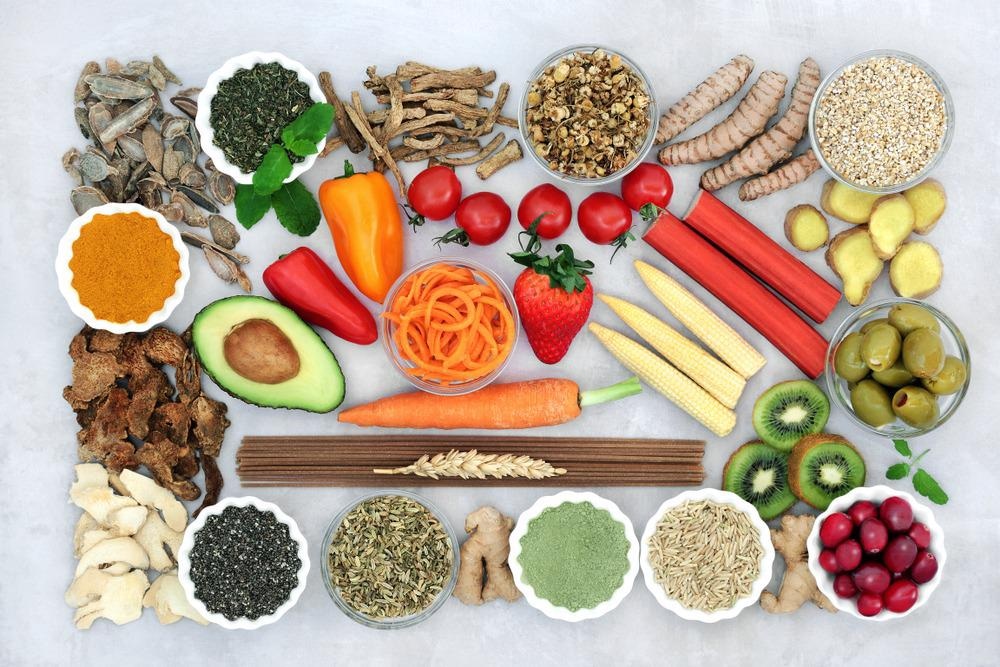The microbiome plays a vital role in a healthy diet
[ad_1]
Diet-related serious health conditions are now viewed as a world-wide pandemic. As a result, advertising and marketing superior well being amongst populations necessitates curtailing faulty and deleterious dietary designs and proof-based mostly suggestions.
The human intestine microbiota performs a important portion in modulating continual illnesses and the expression of the physiological results of diet regime. A latest Cell Host & Microbe review discusses the existing countrywide dietary tips from the viewpoint of the gut microbiota, wherein the scientists emphasis on evidence suggesting that the physiological outcomes of diet program are mediated by host-microbe interactions.
The latest study has validated the hallmarks of balanced dietary patterns, such as the inclusion of greens, fruit, and full grains, as very well as the avoidance of processed meals. However, confusion and controversies persist. In reality, contemporary nutritional recommendations hardly account for the host gut-microbiome interactions with nutritional designs.
Review: Rethinking wholesome ingesting in mild of the intestine microbiome. Graphic Credit: marilyn barbone / Shutterstock.com
Comparable dietary suggestions across the world
Most countrywide dietary rules proposed above the past ten years consistently state that a main part of key meals have to involve vegetables, fruits, and grains, with a choice for total grains, in spite of their origins from assorted nutritional cultures. Comparatively, animal-based mostly or plant-based mostly proteins constitute only a tiny proportion of the advised eating plans.
Importantly, meals with added sugar, salt, and saturated fat are to be consumed in confined portions, while processed and/or packaged meals should be averted.
Wholesome diet and the gut microbiota
Only two dietary rules have talked about the gut microbiota, of which involve the 2013 Nutritional Guidelines for South Africa and Dietary Tips for People in america, 2020-25.
Full-plant foodstuff are strongly advisable, as they supply dietary fibers in the sort of indigestible carbohydrate polymers. These fermentable fibers, which are accessible by the gut microbiota, present advancement substrates for the gut microbes. Moreover, these fibers stop intestine-mucus depletion and bacterial invasion into the mucus layer, so stopping swelling and bacterial infections from developing in these places.
Fermentation of normal nutritional fibers yields quick-chain fatty acids (SCFAs) as the most important by-product, which confer a variety of physiological benefits. These involve ecological added benefits to the intestine microbiome, enhanced gut barrier function, enhanced manufacturing of satiety hormones, increased adipose tissue lipolysis, and much better insulin sensitivity.
In addition, whole-plant meals act as bioactive compounds that bind to nutritional fibers and are instrumental in bidirectional interactions with the intestine microbiota. Comparatively, gut microorganisms participate in the biotransformation of phytochemicals, thereby escalating their bioavailability and absorption, as nicely as antioxidative and immunomodulatory effects.
Nonetheless, complete-plant food items usage stays low in industrialized nations. Meanwhile, controversies linger about recommendations to cut down the use of processed and extremely-processed foods.
Processed foodstuff harbor nutrition that are extra commonly available for digestion, easily fermentable, market bacterial overgrowth and render an unfavorable gut microbial composition and metabolic profile. These food items negatively impact immune and endocrine capabilities and do not favor commensal colonization.
These foods merchandise can also increase epithelial encroachment, as very well as advertise metabolic abnormalities, minimal-grade irritation, and colitis. In addition, the significant salt concentration in processed foods was uncovered to improve proinflammatory gene expression and exacerbate colitis in animal studies.
Veggies and fruits
Vegetables and fruit intake gives a substantial diversity of plant-centered nutritional fibers, the intake of which prevents long-term illnesses. These fibers supply a vast range of physiological added benefits that are both microbiome-linked and microbiome-unbiased.
Some vegetables boost satiety and cut down human body fat, while others support in bettering insulin sensitivity. General, the gut microbiome is partly dependable for mediating the health and fitness effects of fruits and greens.
Plant-primarily based protein food items
Plant-centered proteins like legumes and nuts are abundant in fibers and have phytochemicals that are additional bioavailable than those of grains. The gut microbiome plays a critical part in deriving wellbeing advantages from legumes, these kinds of as lowering pounds acquire and unwanted fat accumulation.
Nuts present unsaturated fatty acids, fiber, as effectively as phytochemicals that influence host-microbe interactions. Amplified nut consumption also advantages human well being as a result of purposeful elements that impact the microbiome.
Fish
Fish is regarded a substantial-high-quality protein as a end result of its favorable fatty-acid content material, as it is a primary supply of the natural way occurring lengthy-chain omega-3 fatty acids. As a result, the regular usage of fish is associated with cardioprotective results and enhanced insulin sensitivity.
Omega-3 fatty acids favorably enhance the microbiota composition and lower white adipose tissue inflammation. The intestine microbiota is instrumental in causing the inflammatory outcomes owing to saturated fats, which can be mitigated by the omega-3 fatty acids present in fish oil. Consequently, the intestine microbiome is responsible for the cardioprotective advantages of polyunsaturated fatty acids.
Nutritional styles
The blend of different foodstuff and their intake in acceptable proportions benefits overall health. Food stuff interactions can also affect the gut microbiome. As a result, sure nutritional patterns, this sort of as the Mediterranean diet regime, can impose intestine microbiome compositional and purposeful alterations.
The Mediterranean food plan endorses a higher ingestion of olive oil, veggies, fruits, legumes, nuts, and full grains, with average portions of fish, eggs, poultry, and dairy, whilst restricting red and processed meats. This diet regime, therefore, influences host-microbe interactions.
Innovative dietary approaches
The latest national dietary pointers align with the helpful effects of gut microbiome-host interactions on human overall health. Areas where taking into consideration the gut microbiome could advance dietary strategies include:
- Evolutionary issues
- Microbiome restoration methods
- Reformulation of processed food items
- Targeted microbiome modulation
- Precision nutrition
- Microbiome discoveries to crank out hypotheses for healthier ingesting
Comprehending the fundamental mechanisms and biological feasibility of the dietary-microbiome interactions in humans can advise nutritional targets and diagnostic markers that can assist in bettering wellbeing.
Eating plan, as properly as wellbeing and very well-being, are strongly linked to the intestine microbiome. Hence, dietary science must focus on microbiome-targeted results for recommending enough dietary tips. Potential nutritional microbiological reports will have to also guidebook healthful consuming patterns, which will contribute to ailment prevention and administration through eating plan.
Journal reference:
- Armet, A. M., Deehan, E. C., O’Sullivan, A. F., et al. (2022). Rethinking healthy eating in light of the gut microbiome. Cell Host & Microbe 30(6); 764-785. doi:10.1016/j.chom.2022.04.016.
[ad_2]
Source link









